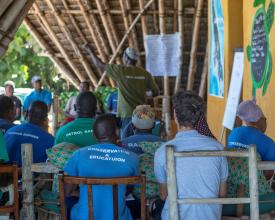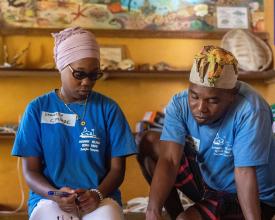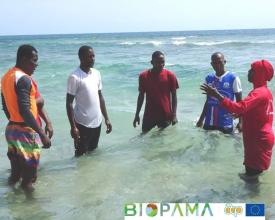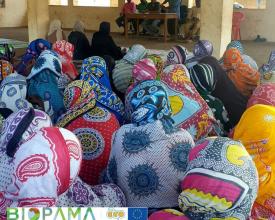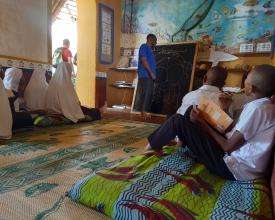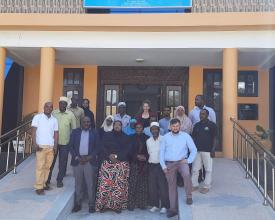
Protecting Chumbe Island Nature Reserve from increased poaching threats due to COVID-19 pandemic, through re-assignment of local rangers, skills development of youth fishers, and sustaining its conservation activities
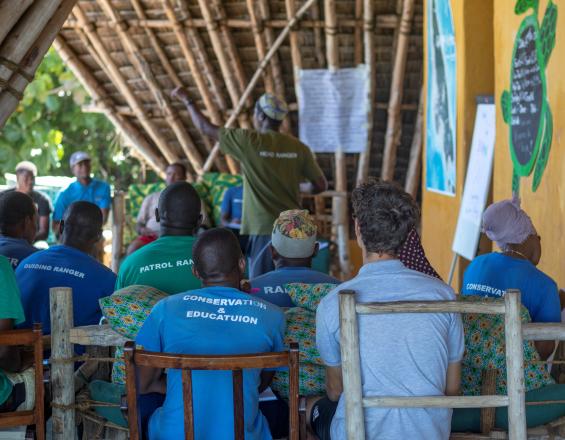
As a not-for-profit, privately managed nature reserve in Zanzibar, Tanzania, Chumbe Island Coral Park (CHICOP) has been the first financially sustainable Marine Protected Area (MPA) in the world, entirely self-financed through ecotourism for nearly 30 years. For the first time in CHICOP`s history, the successful MPA management model was threatened by a worldwide collapse of the tourism sector and funding loss due to COVID-19 pandemic in 2020 - 2021. Through an emergency fund from the Biodiversity and Protected Areas Management (BIOPAMA) Rapid Response Grant financed by the European Union and the Organisation of African, Caribbean and Pacific States, CHICOP ensured that conservation management and biodiversity protection on Chumbe Island not only continued during the COVID-19 crises but also strengthened relationships with other MPAs in the archipelago and enabled skill capacity building for local youth and women.
Context
Challenges addressed
Through extensive outreach and environmental education programs implemented since the start of the Chumbe project (1990s), there were almost no reported cases of poaching prior to the COVID-19 outbreak. The pandemic, however, halted tourism which many people in Zanzibar depended upon for their income. The lack of alternative income opportunities led to ecological and economic challenges. A dramatic increase in poaching attempts and the pressure on fish stocks for food and income was documented by the CHICOP rangers. Additionally, because of the COVID-19 pandemic, half of the workforce of the CHICOP transitioned to home-based working and stipend-supported leave, posing risks to the sustainable continuation of conservation activities that had been maintained for nearly 30 years.
Location
Process
Summary of the process
To sustain the conservation project successfully, raising awareness and fostering positive mindsets for sustainable biodiversity conservation are essential, and can be achieved through extensive outreach and education, as well as ensuring community engagement and involvement at all stages. CHICOP implements on-going EE programs and actively collaborates with representatives from neighboring communities, and this approach has allowed Chumbe Island to become the first financially self-sustaining MPA in the world, receiving acclaim and awards for its successful operations spanning nearly three decades. The combination of sustainable environmental education programs financed through ecotourism and decision-making based on community engagement has been instrumental in the park’s achievements and recognition.
Building Blocks
Environment Education based on an Education for Sustainable Development (ESD) approach
Education played a crucial role in the successful protection of the marine protected area (MPA). Prior to its designation as an MPA (which is 100% no-take zone), the park was a free fishing zone. To increase awareness about the closure of the site in the 1990s, and help local people understand the importance of conservation and its benefits, CHICOP implemented an extensive outreach program and established an Environmental Education (EE) program by providing hands-on environmental education experiences for local school children, teachers, community members and government officials, that has continued to date.
Enabling factors
- Income from eco-tourism has been a primary funding source for the EE program
- Educational programs have allowed local communities, students and international students to gain practical experiences
- The Head Ranger, a former Zanzibari fisher, has been leading the education program for fishing communities
- The active participation of Conservation and Education team in EE program
- Practical insights and knowledge in nature conservation are shared, providing fishing communities with firsthand learning opportunities
Lesson learned
Education is vital for long-lasting conservation efforts. Changing people's mindset is crucial, and continuous environmental education is necessary. A one-day workshop, however, is not sufficient, and environmental education should be consistently provided. Even with ongoing education, it does not guarantee a 100% change in behaviour, as there may be still fishers engaging in illegal fishing activities. In the case of Chumbe, there is a mechanism in place to address such illegal activities through collaboration with government authorities and law enforcement agencies.
It is recommended to not only maintain regular education programs but also establish proper mechanisms to manage potential poaching activities. Additionally, to sustain these activities, it is advisable to explore alternative financing options rather than relying solely on external financial resources, considering the possibility of unforeseen situations such as the recurrence of a pandemic like Covid-19. While BIOPAMA Rapid Response Grant supported CHICOP, long-term sustainability requires careful consideration of uncertainties.
Decision-making based on Community Engagement
CHICOP closely collaborates with representatives from neighboring communities, facilitated through regular village meetings and the establishment of an MPA advisory committee. The park actively engages with the local communities to gather their feedback and incorporate it into the planning and decision-making processes for adaptive management planning and implementation. A recurring 10-year management plan provides the bedrock for the Chumbe project (now in its 3rd iteration). Feedback to planning is collected through in-person interviews and meetings, ensuring open and transparent communication channels with the local communities. Moreover, by providing extensive employment opportunities for the local communities (both on the island, and through supporting a range of off-island enterprises that contribute to island operations, such as sustainable agricultural products, organic soap production and the like), Chumbe fosters mutual benefits, sustainable livelihoods, and ensures strong representation of local community considerations in all aspects of management.
Enabling factors
- Collecting opinions through regular meetings with the villagers and engaging in discussion with local authorities, such as the Ministry of Blue Economy and Fisheries and the Department of Forestry, is a key factor for success in ensuring the protection of the island’s biodiversity.
- The privately managed governance model adopted by the island brought significant advantages in management without generating conflicts of interest among different stakeholders or changes in priorities by the government.
Lesson learned
The successful conservation of Chumbe Island would not be possible without the active involvement, engagement, and support of local communities. The direct contribution and willingness to participate are critical factors for success. It is important to foster an open and inclusive environment where different voices can be heard, and mutual understanding can be built. By actively engaging with and listening to the local communities, a strong sense of ownership and collaboration can be fostered, leading to more effective and equitable conservation efforts
Impacts
- Safeguarding Chumbe's unique biodiversity in the Coral Reef Sanctuary and Closed Forest Reserve, by tackling the increased wildlife poaching risk experienced through the pandemic. The conservation team was expanded to ensure daily, pro-active, educative patrols and encroachment issues were addressed. Environmental Education programs continued involving over 400 fishers from 12 fishing villages in Unguja.
- Preservation of Chumbe's important function as a fisheries nursery ground benefiting fishing communities through spillover and restocking of adjacent fishing grounds. Although many economic activities collapsed during the COVID-19 pandemic, nearby fisher communities maintained their livelihoods through continued fishing in non-protected areas.
- Skills development of 10 local youth involving six months internship placements for two young ocean heroes, while empowering a young Zanzibari woman to become the first female ranger trained in Zanzibar. All interns and trainees participated in conservation and education work, and undertook guiding activities during that period, trained and supervised on-site by the Head Ranger.
- CHICOP held a first ranger symposium facilitated ‘By Rangers - For Rangers’ which strengthened the relationship with other Marine Conservation Areas in Zanzibar. The symposium also facilitated the creation of a Zanzibar Ranger Forum on WhatsApp, with 22 members from all five MCAs in Unguja.
Beneficiaries
- Local fishing communities’ livelihoods through preservation of resources
- CHICOP conservation team
- Young local individuals who were trained as rangers
- Local individuals through employment opportunities
- Locals, public sectors, NGOs and international students
